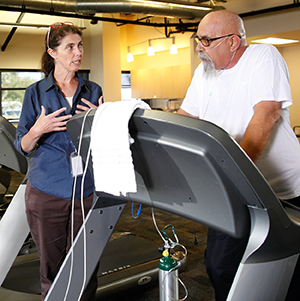Pulmonary Rehabilitation: Getting Started
Pulmonary rehabilitation (rehab) programs can help people with chronic lung disease who often have shortness of breath and have trouble doing their normal activities. Participants may have conditions, such as COPD (chronic obstructive pulmonary disease). Emphysema and chronic bronchitis are 2 main types of COPD. People may have other conditions, such as cystic fibrosis, pulmonary fibrosis, and sarcoidosis. Pulmonary rehab programs will:
-
Teach you the skills you need to live and breathe better
-
Encourage you to put these skills to good use through lifestyle changes
-
Help you set realistic goals so you can make these changes slowly and effectively
Pulmonary rehab professionals

The programs are often led by nurses and respiratory therapists. The team may also include healthcare providers, exercise specialists, physical and occupational therapists, dietitians, social workers, pharmacists, and counselors. Although most programs take place in a group setting, these team members will help you one-on-one when you need it.
Pulmonary rehab is an outpatient program. This means you go home the same day. It's often held at a hospital or clinic. Community-based and home-based programs work as well as hospital-based programs as long as they are held as often and are as intense. Standard home-based pulmonary rehab programs help with shortness of breath in people with COPD. Traditional, supervised pulmonary rehab is the best choice for people with COPD. These programs help manage your disease by helping with breathing methods, exercise, support, and counseling.
Talk with your healthcare provider about which rehab or self-management program is best for you. If you are not in a pulmonary rehab program, ask your healthcare provider or nurse about programs in your area or call your local hospital.
Pulmonary rehab programs
The programs may include:
Making changes that work for you
To reach your goals, you’ll likely need to make changes to your lifestyle. To help make changes go more smoothly:
-
Expect new emotions. It’s common to resist or feel angry or scared about having to make changes. You’re not alone. Share your feelings with the pulmonary rehab team and people close to you.
-
Prepare yourself for slow, steady progress. Change doesn’t happen overnight. To feel your best, you need to commit yourself to practicing your new skills. Over time, you’ll be stronger, have more control of shortness of breath, and be able to do more. But only if you keep at it.
-
Get support. Get support from family and friends as you try new things. Tell the people in your life how they can help you reach your goals. Share your ideas and tips for success with other members of your pulmonary rehab group. And don’t be embarrassed to ask for help. For instance, if you're quitting smoking, ask friends and family not to smoke around you.
My goals
Are there things you can’t do now that you’d like to be able to do when your pulmonary rehab program is finished? Check off the statements below that may apply to you.
I want to:
☐ Breathe better
☐ Understand my lung disease and what I can do to feel better
☐ Have more energy to enjoy my family and friends
☐ Rely less on others
☐ Be able to walk further
☐ Be stronger
☐ Enjoy my hobbies and leisure activities
☐ Eat healthier foods
☐ Quit smoking
☐ Feel less anxious and depressed about my condition
☐ Travel and enjoy myself
☐ Have fewer visits to the hospital or emergency room
Other goals:
___________________________________________________________
___________________________________________________________
___________________________________________________________
___________________________________________________________